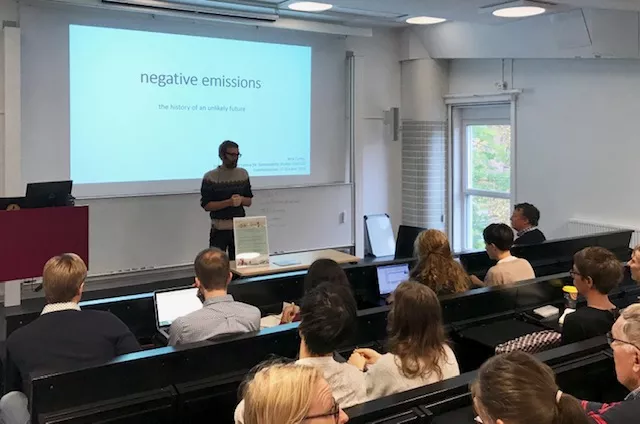Several LUCSUS researchers participated in the week, sharing their visions for a sustainable future and the transitions we need to make to get there.
LUCSUS Director Emily Boyd participated in a panel discussion for the event A vision for a Sustainable Lund University by 2030. During the event, the participants travelled into the future: to 2030, where Lund University was awarded a prize for its work in realising the sustainable development goals. Emily Boyd “remembered” how we managed to internationalise our research while still decreasing our aviation emissions and how students' worsening mental health was addressed. Read a summary of the event here
Rethinking Agriculture, from annual monocultures to perennial polycultures, saw Lennart Olsson lay out the transition towards a more sustainable method of agriculture, by shifting away from annual monocultures to perennial polycultures.
In the event Fantastic Fossil Free Futures, Kimberly Nicholas, together with other researchers, representatives and CEO’s of different companies, presented her view of what a fossil free society in 2050 would look like.
The idea of negative emissions (or large-scale carbon dioxide removal) has become central to proposed scenarios to help address climate change. But are they a realistic and sustainable part of the solution? During the seminar Are negative emissions part of a sustainable transition?, Wim Carton introduced us to the concept of negative emissions, its role and its limitations.
Kimberly Nicholas
What are the major transitions you think we will see in the near future?
A very rapid transition away from current dangerous reliance on fossil fuels.
Which transitions would you like to see?
Just transitions that put people and nature at the heart of stabilizing the climate.
Which would you rather avoid?
Increasing inequality and suffering.
How do you imagine everyday life in a fossil fuel free society would look like? And which transitions would we need to make to get there?
I imagined a car free city center in Lund, where Mårtenstorget has been de-paved and turned into a football field and shared social green space. Parking lots and gas stations have been turned to gardens, and current allotment gardens are focused on food production. Transport and agriculture are Lund’s biggest sources of climate pollution today, so we need to think about how to reduce the need for transport (something all the speakers at the event touched on) and rethinking our food systems to meet human needs and enhance quality of life within the limits of the biosphere.
Wim Carton
What are the major transitions you think we will see in the near future?
We are seeing an intensification of investments in technocratic solutions, from renewable energy to synthetic fuels. Together with the increased questioning of continued dependence on, for example, coal power, the energy transition seems fairly inevitable at this point. The question isn’t really if we will see a widespread uptake of renewables, but how long it will take, and – crucially – if these will fully substitute for fossil fuels, which is currently not the case. And of course, what trade-offs there are with other social and environmental objectives.
Which transitions would you like to see, and which would you rather avoid?
We need a far more radical transformation of the economic system to speed up decarbonization. There are some encouraging sounds coming from public investment banks, but a much more widespread overhaul of economic and financial policy is urgently required: to scrap fossil fuel subsidies; to throw the full weight of the state behind infrastructural investments, rapid electrification of industry and transport; to realign taxation policies with social equity and environmental objectives; to enable farmers to adopt sound land use practices; etc. Ultimately, we will need a significant reduction in energy and resource use, at least in the developed world, to achieve multiple sustainable development goals.
Are negative emissions part of a sustainable transition?
Relying on negative emissions to help achieve climate mitigation targets comes with very significant risks, including the risk that negative emission technologies might ultimately fail to materialize at scale, and the risk that they will have far-reaching negative effects on social justice, food security or biodiversity. The ethical problems with a reliance on negative emissions are worsened by the fact that negative emissions will mostly be implemented in the second half of the century, hence its risks are transferred to future generations. Negative emissions need to be looked into more closely, but if they are to be part of a sustainable transition, they should not distract from emission reductions; they should avoid the kind of land use conflicts that seem inherent in some proposed technologies (such as BECCS), and they should not just end up benefiting vested economic interests. The absolute first priority needs to be reducing emissions to zero.

